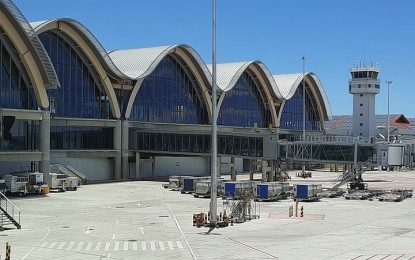
SIGNED DEAL. The Mactan-Cebu International Airport at the height of the Covid-19 pandemic. The GMR-Megawide Cebu Airport Corp. (GMCAC) announces on Friday (May 7, 2021) that it has signed a deal with its lenders to relax agreements on its PHP23.9-billion debt used to develop, operate and maintain the country’s second-biggest airport. (PNA file photo by John Rey Saavedra)
CEBU CITY – GMR-Megawide Cebu Airport Corp. (GMCAC), the private operator of the Mactan-Cebu International Airport (MCIA), has signed a deal with its lenders to relax agreements on its PHP23.9-billion debt used to develop, operate and maintain the country’s second-biggest airport, its parent firm, Megawide Construction Corp., announced on Friday.
Lenders BDO Unibank, Philippine National Bank, Bank of the Philippine Islands, Development Bank of the Philippines, Land Bank of the Philippines, Metropolitan Bank and Trust Co., and the Asian Development Bank have agreed to give GMCAC, some financial relief amid the tough aviation business environment. GMCAC is the airport subsidiary of publicly listed Megawide.
Based on the final terms of the agreement executed by both parties on May 6, the renegotiation of the loan contracts would “free up approximately PHP3.6 billion in cash from 2021-2023 and reinforce GMCAC’s financial position, which can be utilized to support operations while the ongoing pandemic limits air travels,” Megawide said in a press statement.
Under the renewed loan agreement forged by both Megawide and its creditor-banks, principal payments will be deferred to 2027-2029 when the travel industry is expected to have fully recuperated from the ill effects of Covid-19.
“We are glad that the negotiations with our lenders were finalized and we express our sincerest gratitude to our financial partners, who from the very start of this pandemic have been very supportive. The agreement is a strong sign of support and confidence in Megawide’s airport business model. The more relaxed debt servicing schedule will provide our airport operations a clearer runway to full recovery once the situation normalizes,” Megawide chairman and chief executive officer Edgar Saavedra said in a disclosure to the stock exchange on Friday.
As the pandemic wreaked havoc on the travel industry, GMCAC formally solicited for a 30-day grace period for its six-month debt servicing from December 15, 2019 falling due on June 15, 2020, as provided under the Bayanihan Act. The lenders unanimously approved the request on June 11, 2020.
With travel continuing to be restricted, GMCAC requested for a further extension of settlement to September 2020, which GMCAC duly paid on September 15, 2020, including additional interest on the principal and interest accruing from June 15 to September 15, 2020.
On December 11, 2020, GMCAC sent notifications to its lenders to defer its principal and interest payments falling due on December 15, 2020 to February 15, 2021 as the pandemic intensified. On December 15, 2020, GMCAC received a reply from the lenders unanimously approving the request.
“From the very start, our lenders were very accommodating and have been observing the true spirit of Bayanihan. They have genuinely exercised their sworn mandate to act as intermediaries between sources and users of capital, as they have collectively consented to our requests on all occasions. We are very grateful that our lenders actually initiated further discussions to resolve all the issues and settle for a more extensive and mutually beneficial scheme for all parties,” said Ramon Diaz, Megawide’s group chief financial officer, in the same statement.
While the Philippines initially expected a short-lived impact of the virus, GMCAC prioritized cost rationalization and cash preservation as banks took on a more conservative stance.
Both GMCAC and its lenders embarked on a lengthy discussion that focused on formulating a rational, comprehensive, and longer-term program that addresses the cash flow challenges of the airport business during the pandemic, while offering definite, acceptable, and equitable terms to the lenders once normalcy returns. (PNA)
